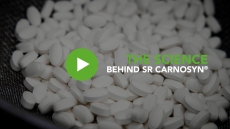Chondroitin remains one of ‘most adulterated supplements in the market’

ChromaDex chief executive Frank Jaksch told NutraIngredients-USA.com: “It’s been a problem for a while. Is it getting worse? I don’t know how much worse it could be. I don’t know how representative my data is. But let’s just say we fail a lot more than we pass and I think the problem is accelerating.”
In the case of chondroitin sulfate, this was less an issue of safety than of consumer confidence, he said. “The materials being substituted are not usually harmful, cheaper polysaccharides and things like keratin sulfate, but if people are buying a product that does not contain what it says it does on the label and it doesn’t work, they will lose confidence in the ingredient and that damages the whole market.
“You only have to look at the price of some supplements to see that the math doesn’t make sense, knowing how much the [bone fide] raw materials cost. If something looks too good to be true, it probably is.”
CPC method cannot pick up adulterants
The CPC (cetyl pyridinium chloride) titration method had become a common method of analysis for chondroitin sulfate, he said, but this could give positive results for other glycosominoglycans and adulterants such as carrageenan, proteins and surfactants.
He added: “Non-specific testing cannot distinguish between chondroitin sulfate and potential adulterants. Using AOAC recommended methods such as enzymatic hydrolysis of chondroitin sulphate followed by analysis by HPLC [high performance liquid chromatography] is expensive and will fail a lot of material and as a result some people are avoiding them.”
GMP (Good Manufacturing Practice) rules did not specify that firms should use a specific testing method – they only require firms to use methodology that’s ‘scientifically valid’, he said. “The certificates of analysis for chondroitin materials we’ve seen will say identify: passed. But they won’t necessarily say anything about the methodology used to establish this.”
The Standardized Information on Dietary Supplement Ingredients (SIDI) working group—a coalition of the dietary supplement trade associations—had recently issued new guidance to firms on certificates of analysis, urging firms to state that analytical methods used “should be demonstrated to provide accurate, reproducible and consistent results for the characteristics being tested”, he said.
“But the guidance is only voluntary. The devil is in the detail of how facilities are inspected and how the ‘scientifically valid’ concept is enforced. People doing inspections need proper training.”
Lab to lab variance
Larry Kolb, president of US operations for TSI Health Sciences, a leading supplier of chondroitin and glucosamine, said: “This continues to be a major problem. There is still a lot of lab to lab variance.
“The USP (United States Pharmacopeia) monograph recognises that the CPC assay methodology can be fooled, but then the enzymatic HPLC method isn’t foolproof either. If there is a big difference between results you get with CPC and HPLC and eHPLC, then you likely have a problem.”
He added: “The issue is a lot of companies are not asking the right questions because they are just interested in price.”
However, Kenn Israel, vice president of marketing at Californian contract manufacturer Robinson Pharma, said he was not surprised material being sent to ChromaDex and other laboratories showed a high level of adulteration because “you’re going to send samples for checking that you are nervous about”.
He added: “Anyone that is taking GMP seriously is doing HPLC with enzymatic degradation because it is widely known that CPC can be fooled.
“Responsible vendors would be worried if the certificate of analysis didn’t specify what testing methods had been used for chondroitin”, he added.
















